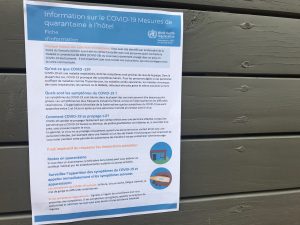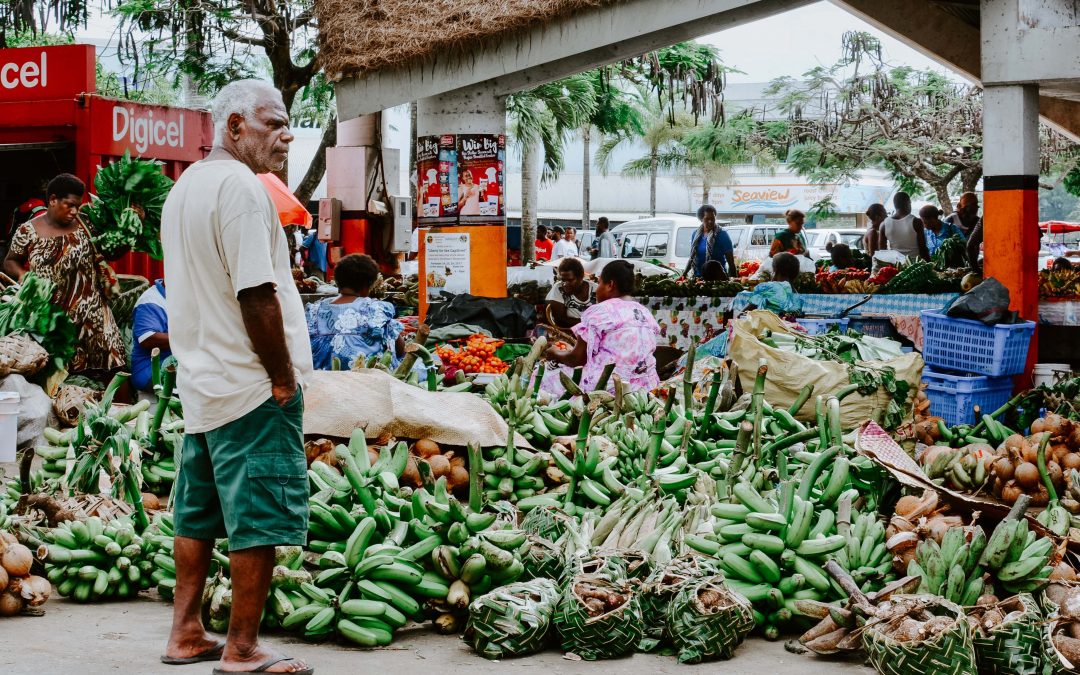Vanuatu remains one of the few countries in the world with no confirmed cases of Covid-19. But cultural activity, remote living, low incomes and a stretched health system make Vanuatu communities highly vulnerable to the spread of such a virus. EWB Australia has been building on the work already undertaken with the Vanuatu Ministry of Health to support community education on Covid-19 in this time of emergency.
Since mid-2018, EWB Australia has been working with the Vanuatu Ministry of Health (MoH) to develop the Sanitation & Hygiene Guidelines as part of the Sanitation in Challenging Environments (SCE) program. These guidelines were in the final stages of the approval process with the Vanuatu MoH Executive Committee when the Covid-19 pandemic struck. As a result of this partnership, EWB has been able to respond to the immediate need for Covid-19 hygiene education.
Stephanie Hamel, EWB Australia’s Vanuatu Country Manager, returned to Australia as part of the mandatory repatriation of EWB Australian staff in light of Covid-19. Whilst now working remotely, Stephanie has been continuing to support and strengthen the critical community health work of MoH through ensuring that current best practice hygiene messaging and resourcing relating to Covid-19 is incorporated into the material used for the new Sanitation and Hygiene guidelines roll out. She has also been ensuring material is translated into national languages. Stephanie’s native French language – and one of the three official languages of Vanuatu – has been hugely beneficial at this time.
“The need to develop country-wide guidelines stemmed from the recognition that communities and the sanitation sector as a whole needed some more consistent information regarding quality sanitation and hygiene messages. As such, it was important to quickly, broadly and clearly communicate hygiene practices to mitigate any transmission of the virus. Responding to the needs of the MoH, posters have been created for specific community groups, such as health workers, bus drivers, market goers, people in quarantine, and kava bar owners,” said Stephanie.

Poster translated into French to support Vanuatu’s Covid-19 community education.
Health workers are at the frontline of directly managing Covid-19, and in Vanuatu, the approximately 60 doctors who service the entire country are mostly recent graduates. With few qualified health workers residing in Vanuatu, many have also been recruited from the nearby Solomon Islands to fulfill nursing roles. Guidelines on the use of PPE, and at which stage of patient consultation are the most important for re-sanitising, formed the key messages of the posters translated for health centres and their workers.
In Vanuatu, sellers at market places (pictured) are another key group to whom specific messages about the need for heightened hygiene have been developed. Translated posters guide market sellers and farmers to apply a one-metre distance rule between seller and customer, and to remind market food preparers to continue to follow the ‘Five keys to food safety’ – Keep clean, separate raw and cooked food, cook food thoroughly, keep food at a safe temperature, and use safe water and raw materials. Parents are urged to keep all children under five years of age at home and away from the market, and anyone who is sick should stay at home until they are well.
Nakamals (kava bars) in Vanuatu have had to change their cultural practices to respond to heightened hygiene requirements. In these bars, people traditionally drink from the same bowl, and spit to rid their taste-buds of the drink’s bitter aftertaste. In the time of Covid-19, these bars can now only provide takeaways and need to ensure disposable gloves are used when filling bottles. Translated posters guide bar owners on the need to provide hand-washing facilities with soap and water to customers; keep the number of customers at safe level to avoid crowding and maintain social distancing; provide take-away plastic containers for customers to use and/or encouraging customers to bring their own containers; wash shells with soap and water after every use. Encouraging customers to bring their own shells to the kava bar; keep tables and chairs clean by wiping down dirty surfaces with regular soap or detergent and water, etc.
As if the Covid-19 pandemic was not challenging enough, Vanuatu has been hit with a second crisis – Cyclone Harold. Vanuatu is considered the most vulnerable country in the world to natural disasters. Amidst the threat of Covid-19 Cyclone Harold battered the Pacific, with Vanuatu the hardest hit. It has created significant damage to some of the northern islands of Vanuatu, including the country’s second largest city. Covid-19 has made providing disaster relief even more challenging.
“TC Harold … couldn’t come at a worse time. Flights are grounded, foreign aid workers have withdrawn, and medical supplies are limited,” Russel Tamata, the lead spokesman for the Vanuatu government’s Covid-19 advisory team, has tweeted.
But Mr Tamata also sees the Covid-19 threat as a blessing; as an opportunity to shift the understanding and mindsets of communities about the importance of hygiene.
“The basic hygiene practices we are trying to promote are old stories – this is what we have been telling people for years and now people are seeing the importance of it,” said Mr Tamata.
This heightened sense of awareness provides a critical opportunity for the MoH, as the Executive Committee aims to expedite approval of the Sanitation and Hygiene Guidelines in order to commence the next phase of implementation – a roll-out to remote communities, which will build on the momentum of the need for better hygiene, now front-of mind due to Covid-19. EWB will be working with the MoH to implement this next phase.
This project receives support from the Australian Government through the Australian NGO Cooperation Program (ANCP).
Additional sources: Ministry of Health Vanuatu, The Guardian, ABC News. Feature photo: Market in Port Vila, by Adli Wahid on Unsplash.
Support EWB’s continued work in Vanuatu at ewb.org.au/DONATE.


